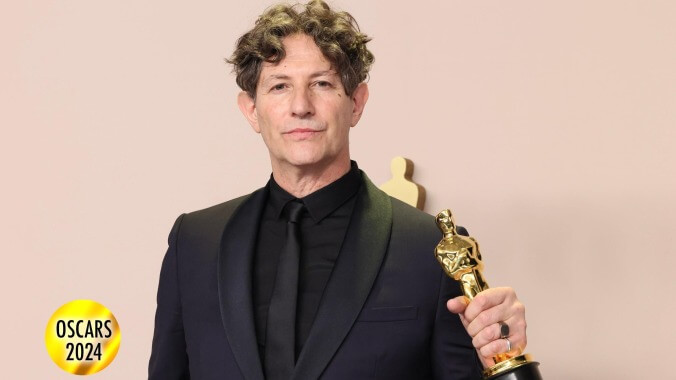Zone Of Interest director Jonathan Glazer Photo: Rodin Eckenroth
At the Film Independent Spirit Awards a few weeks ago, pro-Palestine activists calling for a ceasefire in Gaza disrupted the show a handful of times (that’s what happens when an awards ceremony is held in a big tent outside), leading to a number of presenters and winners struggling to find ways to appropriately acknowledge what was happening both in the world and outside of the tent—most of them probably didn’t know what was actually being yelled outside, but the little off-the-cuff jokes didn’t play well for the people at home who did know.
Though not in any official capacity, the Academy Awards tonight skewed a little more explicit in at least acknowledging Gaza, first on the red carpet with a number of celebrities (including Billie Eilish, Mahershala Ali, Ramy Youssef, and Mark Ruffalo) wearing red “Artists For Ceasefire” pins, plus others wearing Palestinian flag pins, and then a few times onstage (including Cillian Murphy dedicating his Best Actor win to “Peacemakers”).
In his acceptance speech when The Zone Of Interest won Best International Film, writer-director Jonathan Glazer talked about how the film—which is about the seemingly mundane life of a Nazi family running Auschwitz—shows “where dehumanization leads, at its worst.” He then pivoted to talk about dehumanization in Gaza, saying, “Right now, we stand here as men who refute their Jewishness and the Holocaust being hijacked by an occupation which has led to conflict for so many people,” adding, “whether the victims of October the seventh in Israel, or the ongoing attack on Gaza, all the victims, this dehumanization, how do we resist?”
Glazer ended his speech by saying, “All our choices are made to reflect and confront us in the present. Not to say, ‘Look what they did then,’ rather ‘look what we do now.”
Similarly, with Russia’s war on Ukraine still ongoing, 20 Days In Mariupol director Mstyslav Chernov seemed laser-focused on what he wanted to say when he got to the stage. He said he was happy to win the statue for his home country of Ukraine, but that he wished he had never made the film—which chronicles the early days of Russia’s invasion. He went on to say that he wished Russia had never invaded his country and that it had never imprisoned Ukrainian civilians and soldiers, and he called on the people in the room to make sure that the people of Ukraine are not forgotten.
He ended his speech by saying, “cinema forms memories and memories form history,” which received a big standing ovation… and then the orchestra started playing “I’m Just Ken.” That part was weird, but it’s the Oscars. What are you gonna do?

